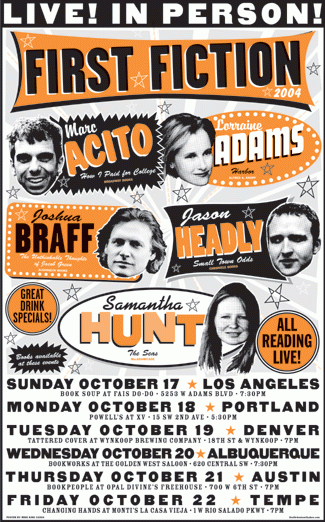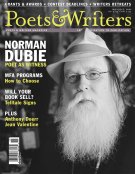Every writer knows how difficult it can be to find a publisher for a first book. But after the elusive book contract is signed, there is another, perhaps even more difficult, task ahead: getting readers to pay attention to that book when it finally arrives in bookstores. Cindy Dach, the events and marketing manager of Changing Hands Bookstore in Tempe, Arizona, recently launched First Fiction Tour, a program that she hopes will heighten the public image of the first-time author. But it’s not what you might expect: She isn’t packing customers into the bookstore, she’s inviting them to the bar.

In October, Dach booked five first-time authors—Lorraine Adams, Samantha Hunt, Joshua Braff, Jason Headley, and Marc Acito—on a whirlwind reading tour of bars in Los Angeles; Portland, Oregon; Denver, Colorado; Albuquerque, New Mexico; Austin, Texas; and Tempe. Dach hopes to make First Fiction Tour a regularly scheduled event; she has tentative plans to organize a tour for the East Coast next spring.
A group of authors in a bar is not a revolutionary concept, of course—writers both famous and obscure have long been among the best customers of taverns throughout the civilized world—but Dach has higher aspirations for First Fiction Tour. Citing Reading at Risk, the report released by the National Endowment for the Arts this past summer that revealed a “dramatic decline” in the number of Americans who read literature, Dach says it is imperative that individuals in the publishing community ask themselves, “What are we going to do to make reading cool again?”
Frustrated by the poor turnout for readings by first-time authors, Dach began last year to look elsewhere for venues. “I had observed that you could go to a bar and listen to a bad band and the place would be packed,” she says.
She invited five debut authors—Audrey Niffenegger, Nell Freudenberger, Nic Kelman, Julie Orringer, and Ryan Harty—to read at a bar in Tempe last fall. More than a hundred people, a considerably larger crowd than the typical bookstore gathering, showed up. Dach says she and the authors didn’t worry too much about whether those in the audience were drawn by the cheap drink specials or the writers themselves. They were just happy that they had drawn a nice crowd, garnered some press coverage, and sold a few books in the process.
So Dach decided to try it again, but this time she solicited the help of other industry professionals. Based on conversations with a group of publicists, many of whom she is in regular contact with for scheduling in-store events at Changing Hands, Dach selected this year’s authors. “More than the book,” she says of her criteria, “it was also the personality of the author” that helped finalize her choices.
The five publishers whose authors were chosen for the 2004 tour—Random House, MacAdam/Cage, Algonquin, Chronicle, and Broadway Books—shared the promotional costs of the readings, including airfare and meals for the authors. Independent booksellers, including Book Soup in Los Angeles, Powell’s in Portland, the Tattered Cover in Denver, Bookworks in Albuquerque, and BookPeople in Austin, also contributed funds to help support the tour. Participating bar owners donated the reading space and offered drink specials. Several of them priced each attendee’s first drink at five cents.
Hunt, an artist and the author of The Seas (MacAdam/Cage), a novel about a young woman obsessed with the ocean, says the relaxed setting of the readings—not to mention the cheap drinks—benefits both the readers and the audience. “It’s nice for me to have a drink before I read,” she says. “It definitely helps people to stick around afterward, and it leads to conversations.” Hunt considers First Fiction Tour in a long tradition of unscripted literary gatherings, noting that readings by the Beat writers were often informal and sometimes took place in bars. “It seems more of a return to a style of reading than something new,” she says.
“You hear about those famous Bukowski readings where he was throwing beer at people,” says Braff, whose first novel, The Unthinkable Thoughts of Jacob Green (Algonquin), tells the comic tale of a young man’s coming of age in New Jersey in the 1970s. “The advantages [of an event like this] are that people are in kind of a festive mood.”
First Fiction Tour isn’t the only reading series that’s trying to shake things up. Readings hosted by McSweeney’s, the literary journal edited by Dave Eggers, have become popular due in part to their irreverence. The events offer everything from juggling demonstrations to haircuts. The American Journal of Print, a Brooklyn-based magazine that has gone on hiatus, hosted readings in recent years that featured comedy troupes and bands performing cheeky cover versions of 1980s pop songs. Arthur Bradford, the author of the story collection Dogwalker (Knopf, 2001), has been known to augment his readings with riffs on an acoustic guitar, often smashing it, Pete Townsend–style, at key points in the narrative.
It’s unlikely that First Fiction Tour events will result in any damaged instruments, but the marketing tactics do borrow from the world of music promotion. The tour’s tag line is “Five authors, six cities, and many drinks.” A poster designed for the 2004 tour recalls the rock concert handbills of the 1960s. It was produced by longtime rock poster designer Mike King, who also designed First Fiction Tour T-shirts.
Although there are no definite plans for a second First Fiction Tour, Dach hopes the success of the first series of events will lead to more. Noting that she would also like to reach younger readers, she says, half-jokingly, “Maybe we’ll do a lemonade stand.”
For more information about First Fiction Tour, visit changinghands.com or send an e-mail to FirstFictionTour@yahoo.com.
Kevin Canfield is a journalist in New York City.








